This is a brief, to-the-point overview of basic keyword research for bloggers.
Keyword research is a massive SEO topic that has been covered by many different professional bloggers.
I used to be somewhat scared of keyword research. For years, I found it intimidating. I always thought that you needed one of the fancy expensive tools like Ahrefs or SemRush in order to do proper keyword research. Professional bloggers made it seem like it was impossible to find easy-to-rank keywords without the software.
Thankfully that is not the case at all.
Keyword research does not need to be expensive and complicated.
There are lots of different methods and strategies to do keyword research but today I’m going to share my personal method. I’ll go over my tips for finding the best keywords to help plan your blog content and grow your blog’s audience.
First things first.
What is Keyword Research?
Keyword research is the process of planning your blog’s content based on the search terms that people actually use.
The idea behind keyword research is to use words that your audience is most likely to search for in order to help them find your content.
If you have a great idea for a blog post but you describe it incorrectly, then your intended audience will have a difficult time finding it. Keyword research helps to optimize your content using the best possible phrases and words so that it can be found by as many people as possible.
Even if you are a native English speaker, we all have different ways of expressing ourselves. A phrase or term that you believe is common might not be the case.
Doing a quick Google search for every topic you wish to write about can give you the confirmation you need that you’re on the right track for the direction of a blog post.
Extensive keyword research can also help ensure that you’re covering a topic as adequately as possible. Keyword research is used to plan out the headings that will appear within a blog post.
Preliminary Work
Before you begin keyword research, there are a couple of steps to take ahead of time.
Brainstorm Topics
The first thing to do is begin brainstorming blog topics that you want to write about. If you’re already familiar with your niche, this shouldn’t be too difficult.
I like to organize my blog post ideas using Google Sheets or Excel. I put one category per tab and use the first row to write all of the different subtopics that I will write about.
Below the first header row are all of my individual blog post ideas. I keep the topics to just 2 or 3 words which will later service the slug of the blog post.
Prioritize
Next, it’s time to prioritize the blog posts that I want to work on. I typically write high-priority keyword terms towards the top of the Excel sheet.
Okay, let’s begin with how to do keyword research as a niche site blogger.
Keyword Research Method
My keyword research method is quite simple and straightforward.
Personally, I do not use any of the paid keyword research tools mentioned by many other bloggers. The estimated search volumes are often incorrect and these tools can be very expensive. Not to mention, they give away valuable data from your own website to your competitors. For this reason, I do not recommend them. Instead, there are a number of ways to do free keyword research using free tools.
Do a Google Search
Unsurprisingly, Google is the best platform to do keyword research on. In an effort to help its users find the information they need Google has added a number of search helpers in different areas. In doing so, Google has also helped content creators understand what content needs to be created. It’s a win-win for publishers and readers.
First, visit Google.com. Start typing in the first keyword you’d like to research. As you’re typing, you’ll notice that several different suggestions pop up below the text input box.
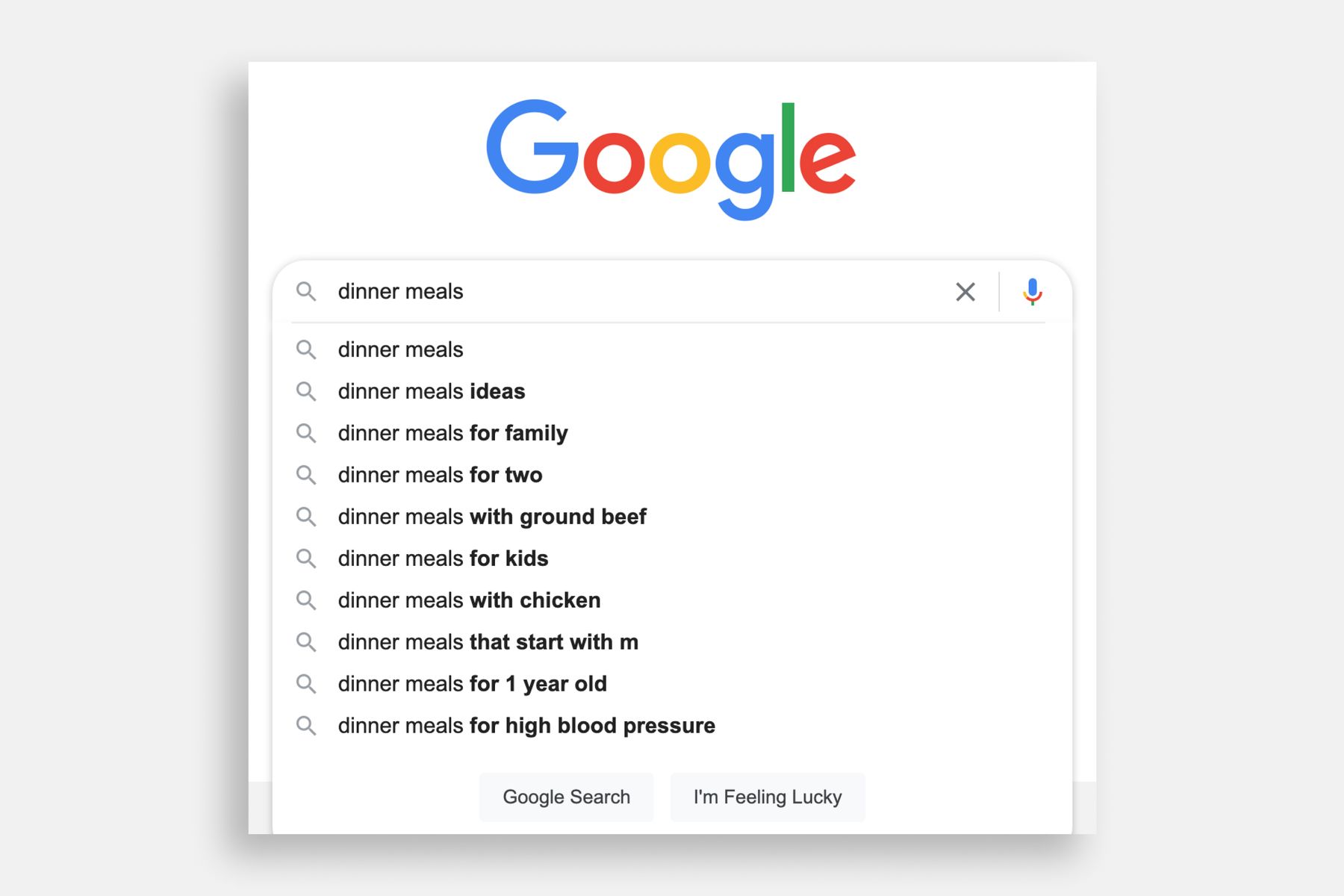
Google Autofill Suggestions
These are called “autofill suggestions” and they can be a gold mine for keywords! Google is essentially trying to read your mind and predict what you will type next. They do this by analyzing data from their search history database. Google suggests the words you might type next. Some of the words will be similar, but others will be totally different.
The Alphabet Soup Method
Knowing how autofill works, you can put each letter of the alphabet after a high-level keyword in Google to see what it suggests. I later learned that this is a widely known technique known as the “alphabet soup” method for getting keywords!
It works best on really general, one or two-word keywords. Here is an example using the keyword “dinner meals” followed by the letters a, b, and c.
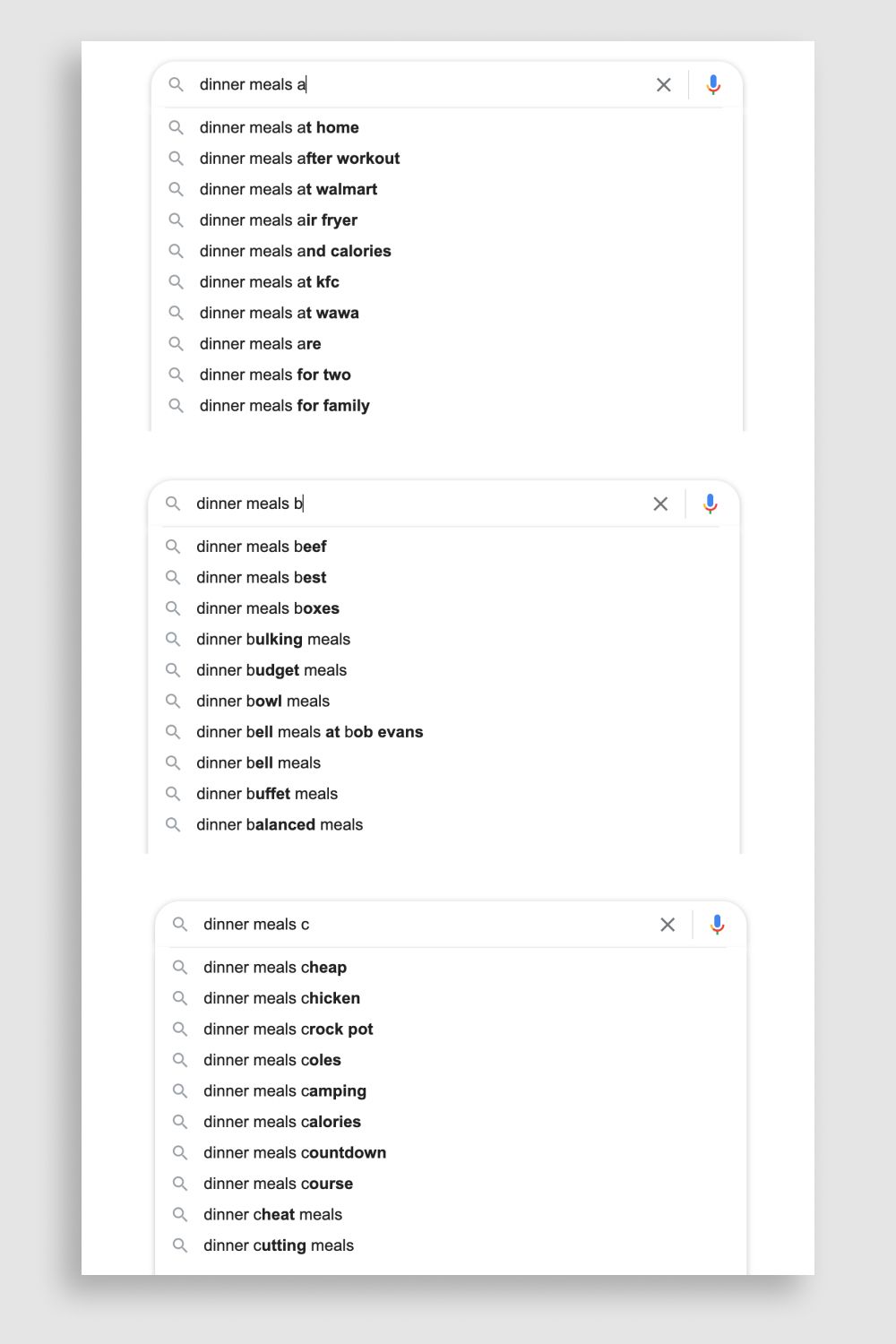
As you can see, there are tons of amazing blog post topic ideas there!
“People Also Ask” Questions
OK, now you can press enter on your search. Mid-way down the search results page, you’ll see a section of questions called “People Also Ask.” These are great questions to write as standalone blog posts, or in the bottom portion of your blog post for a keyword.
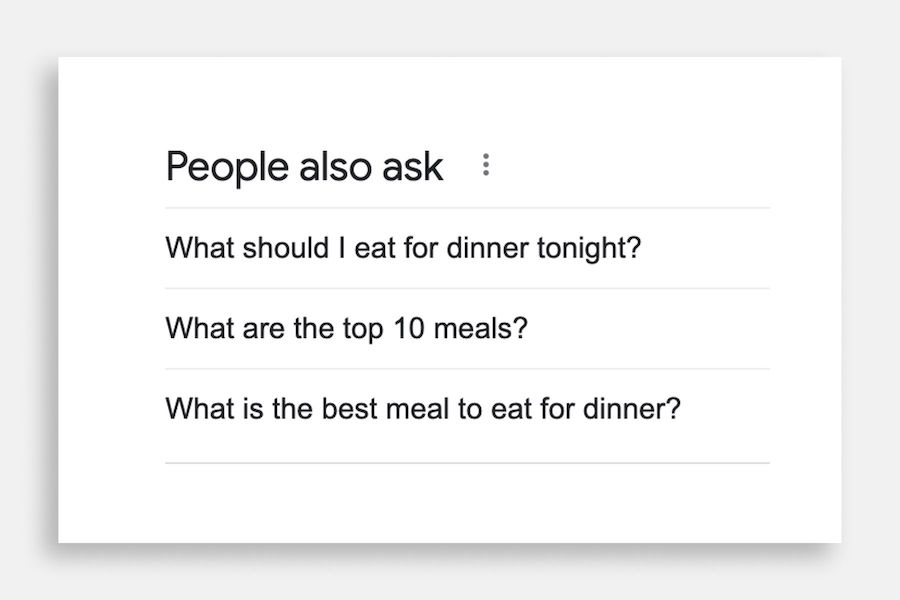
Related Searches
At the very bottom of the Google search results page, you’ll see a group of 8 or so related searches. These are common searches people do after searching for the keyword you searched for. They can make for great subheadings or new post ideas.
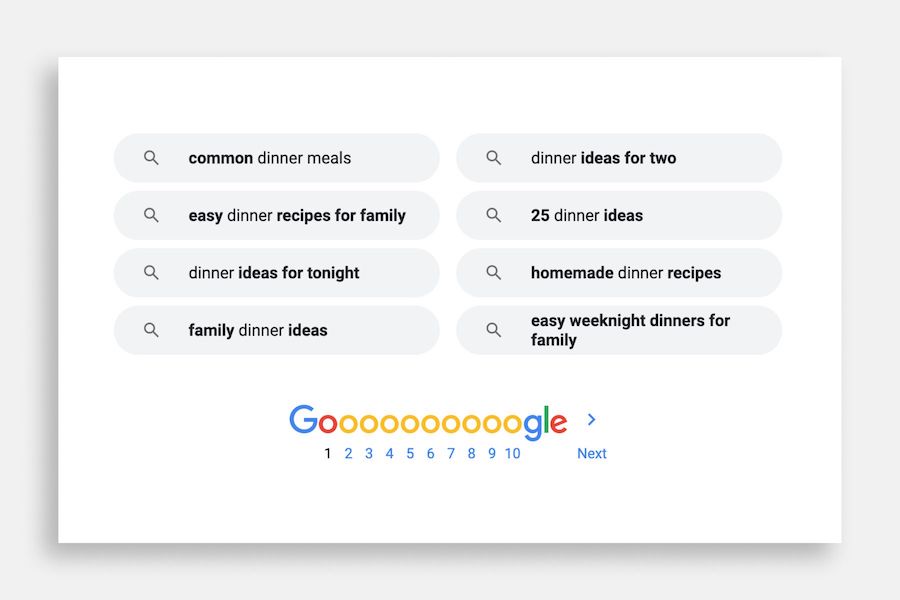
Retail Websites
Another great place to find keywords or subtopics for your blog post content is retail websites. If you are creating an affiliate marketing website then you definitely will want to visit the main retailer that you plan to promote. Look at how the e-commerce website organizes its categories of products. Do you have all of those product categories listed on your blog post planning spreadsheet? If not, be sure to comb through each product category and be sure it’s covered.
Competitor Sites
While this is not my favorite method, many bloggers recommend looking at your competitors’ websites and comparing them with your own to find keywords. Their categories and top-performing post topics should be present on your website as well, whether in the form of an article or a category. You can use SimilarWeb.com to find similar websites and competitors for any site.
Determine the Exact Keyword to Use by Analyzing Search Volumes
Next, I analyze the search volumes of the keywords that I plan to target using the Surfer Chrome extension. Others use Google Keyword Planner but I find it too complicated.
While I prefer to create a comprehensive website that serves my readers well regardless of the search volume of that term, Surfer helps me narrow down the slug I need to include in the post.
Most keywords have different varieties for the same user search intent. Surfer helps you pick the best keyword match for a topic you want to write about.
Here’s an example:
Let’s say you want to write an article about “tools needed to demo a wall” for a tool blog. Type it into Google and hit Search.

Surfer tells me that it has zero search volume, but it suggests similar search terms that have more volume. For this example, I would go with a keyword slug like “tools for demo” or “demolition tools” since those terms have far higher volume.
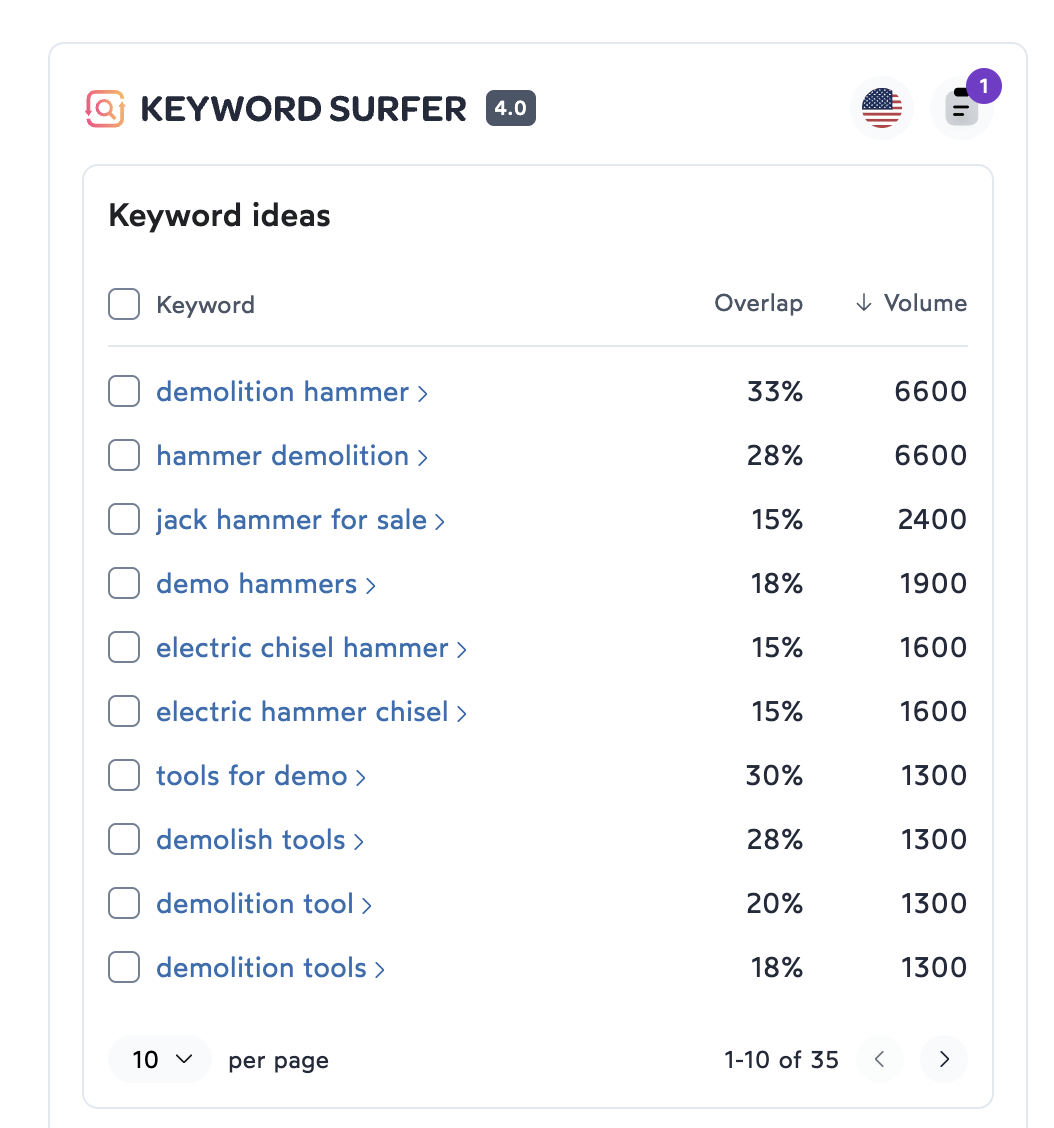
Plus, if you’re targeting thousands of keywords then it’s worth analyzing the search volume to help you prioritize which ones to work on first.
Free Keyword Tools
There are several free keyword tools that you can use to do keyword research for your blog. I typically don’t use them very often because I prefer to actually read other blogs on the topic that I’m writing about and see what other bloggers have come up with, but I will share these keyword tools with you in case you want to test them out for yourself.
Long-Tail Keywords
“Long-tail keywords” is a phrase that you’ll see often once you begin reading about blogging keyword research. Long tail keywords are simply keywords that are typically more than three or four words long.
Because they are longer, fewer people are searching for them, but there is far less competition than shorter keywords so you have a greater chance of ranking for them.
As a new blogger, it’s a smart idea to target long-tail keywords. Long tail keywords can be great for driving traffic to a new blog faster.
For example, instead of targeting the keyword “one week in Spain” you might write about “one week in southern Spain” or even better “one week in southern Spain with kids.”
The modifiers “southern” and “with kids” turn those general search terms into long-tail keywords.
Competition and Difficulty
Don’t worry too much about competition and difficulty when attempting to rank for a keyword. If the topic fits your blog, and you think it will be useful to your readers, then write the blog post! Just be sure to use the proper phrasing so that people can find it. You will be surprised that over time as your website gains authority, you’ll rank for terms that you didn’t expect to.
Happy keyword researching!
